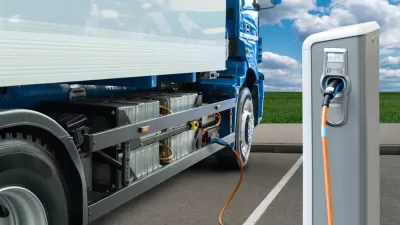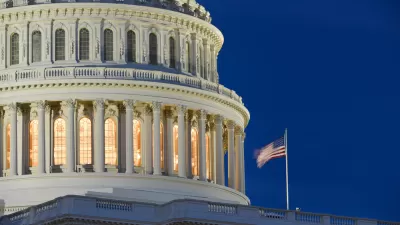Four House Democrats joined all but one Republican to enact the Congressional Review Act to roll back President Biden's rule on heavy truck pollution approved by the EPA last December. The Senate had earlier narrowly passed the joint resolution.

House and Senate Republicans successfully enacted a legislative tool that was heavily used at the beginning of the Trump administration in 2017 to roll back environmental rules approved during the Obama administration. The Congressional Review Act enables both chambers to overturn federally approved rules with a simple majority, thus bypassing the filibuster in the Senate that requires 60 votes. But the resolution is still subject to a presidential veto.
President Joe Biden has signalled that he intends to do just that to save the “Control of Air Pollution from New Motor Vehicles: Heavy-Duty Engine and Vehicle Standards,” approved by the U.S. Environmental Protection Agency on Dec. 20, 2022. It will be his fifth veto since the Republicans took control of the House of Representatives after the red ripple in the midterm elections.
The standards marked “the first update in 20 years to nitrogen oxide rules,” wrote Rachel Frazin who covers energy and environment policy for The Hill, after the rule was approved. NOx are major contributors to ground-level ozone pollution (smog) and particulate matter.
Frazin reported on April 26 on the narrow passage of Senate Joint Resolution 11.
The vote was 50-49. Sen Joe Manchin (D-W.Va.) voted with Republicans to get rid of the rule. Sen. Dianne Feinstein (D-Calif.), who has been absent from the Senate amid health issues, did not vote.
Sen. Deb Fischer (R-Nebraska) made it clear in her statement after the successful vote that her main reason for targeting the air quality rule was inflation and concern that it would not achieve cleaner emissions.
By increasing the cost of a new truck, the regulation actually incentivizes keeping older, higher-emitting trucks in service longer. It would also likely force many “mom & pop” commercial trucking operations out of business while encouraging larger trucking operations to pass these higher costs onto consumers.
House vote
Frazin reports in the source article for this post on the narrow passage (221-203) in the House on May 23. Republicans secured a handful of Democrats from competitive or crossover districts so that the rollback could be viewed as bipartisan.
Democrats Henry Cuellar (Texas), Jared Golden (Maine), Vicente Gonzalez (Texas) and Mary Peltola (Alaska) voted with Republicans in support of overturning the rule. Republican Brian Fitzpatrick (Pa.) voted with the rest of the Democrats against doing so.
Hat tip to The Hill's Energy & Environment newsletter published on May 23.
FULL STORY: House votes in favor of overturning Biden truck pollution rule

Study: Maui’s Plan to Convert Vacation Rentals to Long-Term Housing Could Cause Nearly $1 Billion Economic Loss
The plan would reduce visitor accommodation by 25,% resulting in 1,900 jobs lost.

North Texas Transit Leaders Tout Benefits of TOD for Growing Region
At a summit focused on transit-oriented development, policymakers discussed how North Texas’ expanded light rail system can serve as a tool for economic growth.

Alabama: Trump Terminates Settlements for Black Communities Harmed By Raw Sewage
Trump deemed the landmark civil rights agreement “illegal DEI and environmental justice policy.”

How Community Science Connects People, Parks, and Biodiversity
Community science engages people of all backgrounds in documenting local biodiversity, strengthening connections to nature, and contributing to global efforts like the City Nature Challenge to build a more inclusive and resilient future.

Alabama: Trump Terminates Settlements for Black Communities Harmed By Raw Sewage
Trump deemed the landmark civil rights agreement “illegal DEI and environmental justice policy.”

Dear Tesla Driver: “It’s not You, It’s Him.”
Amidst a booming bumper sticker industry, one writer offers solace to those asking, “Does this car make me look fascist?”
Urban Design for Planners 1: Software Tools
This six-course series explores essential urban design concepts using open source software and equips planners with the tools they need to participate fully in the urban design process.
Planning for Universal Design
Learn the tools for implementing Universal Design in planning regulations.
City of Santa Clarita
Ascent Environmental
Institute for Housing and Urban Development Studies (IHS)
City of Grandview
Harvard GSD Executive Education
Toledo-Lucas County Plan Commissions
Salt Lake City
NYU Wagner Graduate School of Public Service





























